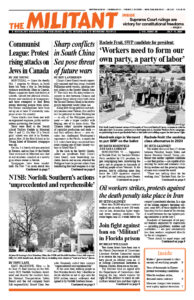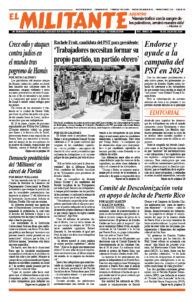July 19, 1999
CEIBA, Puerto Rico — In a sea of Puerto Rican flags, 50,000 people marched here July 4 to demand the U.S. Navy leave the island of Vieques. At the beginning of World War II, the Navy took over two-thirds of the island and has remained there, with devastating effects on the livelihoods of the residents, many of whom are fishermen.
The renewed groundswell of protests was precipitated when a Navy warplane dropped two bombs off course and killed David Sanes, a Vieques resident employed by the Navy.
The outrage among working people marks a resurgence of nationalist sentiment that was evident last year in the working-class support for the telephone workers strike. That battle, opposing efforts of the Puerto Rican government to sell the state-owned phone company to the U.S. company GTE, culminated in a general strike of half a million workers.
July 19, 1974
NEW YORK — In perhaps the largest outpouring since the Christopher Street Liberation Day demonstrations began in 1970, some 20,000 people marched here on June 30.
The event commemorates the Stonewall rebellion of June 1969, when patrons at the Stonewall Inn, a gay bar on Christopher Street in New York’s Greenwich Village, fought back against a police raid and helped to inspire the gay liberation movement.
Organizers of the march were surprised at the large turnout. They attributed it to anger over the defeat of Intro 2, the gay civil rights bill that was recently voted on by the New York City Council.
Among the marchers was a contingent of Socialist Workers Party supporters and candidates, including Derrick Morrison, SWP candidate for governor of New York. They walked with a banner demanding, “Pass the New York Gay Civil Rights Bill.”
July 18, 1949
As the London longshoremen’s strike entered its third month, the Laborite government invoked and applied the Emergency Powers Act to try to break the strike by use of armed troops and legal terror. A vote by striking longshoremen to continue their two-month walkout resulted in proclamation of state of emergency by King George VI, empowering the Labor Government to use troops to break the strike.
The ranks of the strikers increased after this open act of government strikebreaking. Labor Minister George Isaacs told the House of Commons that the number of men on strike had risen to nearly 13,000.
The mood of the longshoremen was indicated by their voting overwhelmingly to continue the strike while the Cabinet was convening on the issue amid cries of “treason,” “agitators from abroad,” and the ominous threat of the dictatorial decree.

